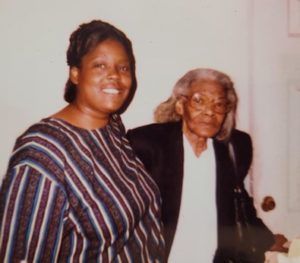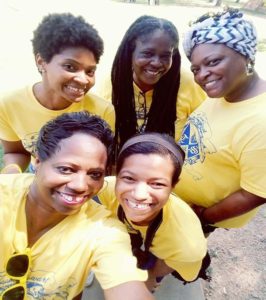calsfoundation@cals.org
Learning Who I Am
Early in life, I learned that in the United States of America, there was once a “one-drop rule” determining whether a person was black (or “colored” or “Negro” in the terminology of a certain time frame). The rule specified that one ancestor with “one drop” of black blood determined you to be black.

My disconnect was in the fact that I had no proof of that claim other than what I saw in the mirror. My family history was shared with me by my grandmother, Lillie Stewart Toombs. She had given me what she had known. Those clues led me to information she didn’t have. I knew her mother, Neta Roland Stewart, was born and raised in Morrilton in Conway County, Arkansas. Neta’s mother is Mariah Holyfield Roland, who records show lived in Morrilton. She appears on the 1870 federal census in that location, living with her mother, Mary Holyfield, along with siblings Rena and Nancy. Evidence shows that the family lived in Lewisville prior to the Civil War. Threats from the Ku Klux Klan motivated the move to Morrilton. A death record suggests Mariah’s father is Esau Holyfield. (See this earlier blog post for more about Mariah.)
I’ve taken the Ancestry DNA test and the 23andMe DNA test. Both confirmed I have a European mixture in my DNA. Both confirm a small percentage of Native American ancestry. The one-drop rule would eliminate any claims I have on the biological mixture I have other than black. I also took the African Ancestry DNA test. My MatriClan test determined that I share maternal genetic ancestry with Yoruba people in Nigeria today.

This information completes a frame for me. I know that in 2024, my maternal line had been in America for at least two hundred years. The African Ancestry DNA test allowed me to know that my family is from a specific location and group of people on the continent of Africa in a time period earlier than I could imagine. Documentation of the transatlantic slave trade provides insight into a window of time when my ancestor left on the traumatic trip to North America. The fact that I live is a testament to the survival of this ancestor.
Details take on new meanings. My grandmother and her siblings described their mother as “mean.” It may be an interpretation of her personality and not an honest description of her full self, however. She taught her children to be self-sufficient with marketable skills to sustain them through life. She lived a short lifespan, so maybe she felt the limitations of time to prepare them for life without her.
A neighbor recently told me that I have a reputation of being mean. I challenged his statement with the explanation that I am bluntly honest and not willing to sugarcoat the truth so that others can swallow it without it stinging. Could this be a trait that traveled the ancestral train within me?
The knowledge of where my ancestral beginnings are on one line of my family tree allows me to place into context information I find on the details of life for people connected to me. This framework allows me to complete the picture of my genetic journey as I gather more information on the ancestors preceding me.
By Rhonda Stewart, genealogy and local history specialist for the Central Arkansas Library System’s Butler Center for Arkansas Studies, housed in the CALS Bobby L. Roberts Library of Arkansas History & Art
***
Come to the Research Room of the CALS Bobby L. Roberts Library of Arkansas History & Art to start your own family research! Visiting information is here. There are also many genealogy resources online through the library that can help you get started: https://cals.org/research-tool-subject/genealogy




